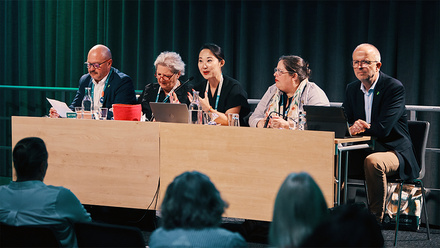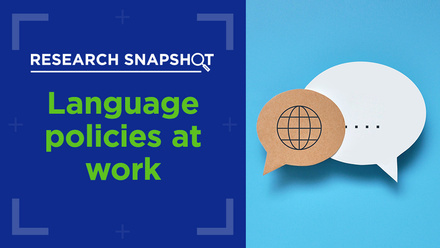Standing up for universities in Venezuela and Nicaragua

The second essay in the 2020 Conversation Starter series takes us to Latin America, where in some countries repressive regimes are threatening not only our shared values, but also the lives and livelihoods of students and university staff. What role can universities in Europe and beyond play in standing up for academic values and standing in solidarity with our colleagues on other continents?
A major challenge of our age is the growing fragmentation within civil society. The coarsening of political discourse and the turn toward populism and authoritarian political leadership seem to be universal trends. Indeed, according to the Varieties of Democracy 2019 report of the University of Gothenburg, Sweden, democracy is weaker today than it has been for decades. We see these trends on many continents, not least in Latin America.
The reduction of trust in democratic institutions, the weakening of traditional political parties, rising corruption and increasing poverty, among other factors, have weakened democracies and the rule of law in several Latin American countries in recent years. This weakening of democracy, in turn, makes ensuring human rights more difficult and adversely affects income equality and economic growth in the region. These problems are gravely accentuated in the current situation of the coronavirus pandemic.
Two countries that are currently suffering severe political crises are Nicaragua and Venezuela, with Venezuela also immersed in a humanitarian crisis. These situations have serious implications for the higher education communities in these countries and, if Europe is true to its ideals of solidarity, demand creative and meaningful responses from the European higher education sector.
Nicaragua: "disproportionate repression"
There are deep international concerns about the ongoing and increasing acts of violence and repression experienced by Nicaraguan society since April 2018. Since taking office in 2007, President Daniel Ortega has dismantled the institutions that could limit his government’s actions. According to international organisations such as the Organization of American States and Human Rights Watch, a clampdown by national police and armed pro-government groups in 2018 left 300 dead, over 2000 injured and 777 arrested and prosecuted.
Higher education institutions in Nicaragua suffer both military and financial intimidation
Some Nicaraguan universities are the only and last place in the country where there are still protest marches against the government of Daniel Ortega and his wife and vice president, Rosario Murillo. Currently, higher education institutions in the country suffer both military and financial intimidation. Campuses are surrounded by police and paramilitaries that harass and intimidate students and workers. At the same time, according to José Alberto Idiáquez, Rector of Central American University Managua, the government cuts funds and denies the permission to operate legally as a university to those institutions that don’t align with the regime. Idiáquez himself is now under a death threat due to his participation in government negotiations as a member of civil society. From his perspective, "disproportionate repression" has characterised the government’s actions in Nicaragua. Yet, this has been met with an inspiring reaction by brave university students, followed by other young people and then the society at large, to address the abuses of power in the country.
Venezuela: Bolivarian Republic on the brink
Venezuela was once one of the most prosperous and democratic countries in the region, with a middle-income economy and democratic rule since 1958. However, since 2012, and more dramatically since 2016, Venezuela has been in the midst of an unprecedented man-made humanitarian crisis, suffering from hyperinflation (7,374% annually) and economic contraction over the last 5 years to the tune of a 75% reduction in GDP. Millions of Venezuelans have been forced to leave their country due to severe shortages of food, medicines and access to essential healthcare; the collapse of most public services and utilities; and soaring crime rates. "The massive exodus of Venezuelans" – 4.8 million people since 2014 – "represents the largest migration crisis of its kind in recent Latin American history," according to Human Rights Watch.
Meanwhile, the government continues to subsist thanks to a parallel economy based on the exploitation of natural resources, while undermining democratic processes and principles and "repressing dissent through often violent" and extra-judicial means.
Universities in Venezuela continue to see themselves as instruments to pursue the restitution of democracy
Despite this bleak situation, universities in Venezuela continue to see themselves as a source of hope for the future of the country, and as instruments to pursue the restitution of democracy and the freedom that they see necessary to provide a dignified life. Although the economic and social situation makes it difficult to continue operations, many are subsisting with minimal resources and with notable financial constraints.
Where does the conscience of Europe lie?
The European Union (EU) is guided by a set of core values on which it was founded, including "… respect for human dignity, freedom, democracy, equality, the rule of law and respect for human rights, including the rights of persons belonging to minorities". With these values in mind, the EU has condemned the situation in both Venezuela and Nicaragua by adopting restrictive measures – such as freezing assets, or placing restrictions on equipment used for internal repression or for telecommunications – with the goal of fostering credible and meaningful processes that can lead to peaceful negotiated solutions. Venezuela and Nicaragua are the only two countries on the American continent facing such restrictions from the EU.
However, how should European higher education institutions themselves approach this reality? Do we not have a role to play in promoting and defending democracy and human rights, especially the rights of universities around the world to pursue the fulfilment of their mission in freedom and without fear? How can we, as educational and research institutions, respond to the abuses being inflicted on the populations and universities in these countries? On which side of history do we want to stand?
The global health crisis of the COVID-19 pandemic has reminded us that we live in a globalised context and thereby our lives are interconnected. The COVID-19 pandemic should be a call to all of us to remember and re-examine the universality of the mission of higher education institutions to work for the common good of all people around the world.
One might feel frustrated because of the limited span of actions that we might have, but we can share and embrace the call to collaborate in the search for truth, justice, and reconciliation. We can be creative in finding ways to help the Nicaraguan and Venezuelan populations and their universities through a variety of possible actions, including:
- Drawing international attention to the government abuses and the humanitarian crisis of these two countries. Raising awareness and consciousness can foster the interest and ability of public and private institutions to respond.
- Exploring pathways to educate global citizens and cultivate students who are skilled in critical thinking and ethical judgment. We should continue to develop students’ consciousness about international issues and contexts.
- Looking at ways that research can help to heal and rebuild these countries and societies. We should support research that seeks to find the heart of these countries’ issues and recommend alternatives and hope-filled solutions.
- Intensifying our support for displaced students, faculty, and staff by welcoming them to undertake sojourns at our universities. These opportunities can offer respite from the oppression they suffer day to day and open the possibility for them to continue their academic careers in cases where this is no longer possible in their home countries.
A networked approach
Any institution can engage in these kinds of actions, but sometimes operating through established networks can provide especially meaningful pathways forward in difficult circumstances. For example, many universities in Spain have strong connections with institutions in Latin America due to historical ties. These can offer natural roadmaps for providing support.
Interestingly, new and old patterns of engagement through the global network of Catholic institutions are also being leveraged in an effort to sustain Nicaraguan and Venezuelan institutions. Notably, the networks of Jesuit universities in Latin America (AUSJAL), in Spain (UNIJES) and more broadly in Europe (Kircher Network) have developed campaigns to draw international attention to the violations of human rights and university freedom in these two countries. Several Jesuit universities in Latin America and Europe have provided direct economic support to Central American University in Nicaragua and to Andrés Bello Catholic University in Venezuela, and have helped these two universities to organise campaigns to connect with their international alumni.
Likewise, the AUSJAL network has implemented a special faculty mobility programme with the three Catholic universities in Venezuela. Six Jesuit universities from Mexico, Colombia, Ecuador and Peru have identified and invited professors from Venezuela to teach a semester at their campuses. Finally, the Consortium of University Libraries of AUSJAL, with private sector support from EBSCO and E-Libro, have provided access to their academic databases at discounted rates to the university libraries of its member institutions in Nicaragua and Venezuela. The Kircher Network, in Europe, also wants to implement some of these initiatives with the support of the European Union.
Do we not have a role to play in promoting and defending the rights of universities around the world to pursue their mission in freedom and without fear?
Loyola University Andalusia, a Jesuit university in Spain, participates in many projects that promote research, training, and on-site interventions focused on development and cooperation, paying special attention to Central America. The university believes in an "interinstitutional service-learning model" intended to promote mutual social transformation.
Loyola Andalucía has been involved in these social justice initiatives for more than 30 years, in collaboration with other three Jesuit universities – Central American University Managua (Nicaragua), José Simeón Cañas Central American University (El Salvador) and Rafael Landivar University (Guatemala) – thanks to a multilateral agreement between the four institutions. This collaboration has gone through three phases, which have variously encompassed knowledge transfer through faculty exchange, training of trainers and support to university management; international cooperation projects and support for the formulation of public policies for development; and research and cooperation projects related to development, linking knowledge and practice. This programme receives support from the European Union, mainly for student, faculty, and staff mobility between these universities.
These examples of Catholic university networks offer one possible way for higher education institutions to promote the common good in Venezuela, Nicaragua and elsewhere, in defence of both human rights and autonomy in higher education. Of course, Europe’s higher education sector has many types of institutions that are equally committed to making the world a better place through solidarity and creative engagement with sister institutions in need. No matter how we choose to proceed, a pandemic and political upheaval make it clear: the time to act is now.
Questions for discussion
- What responsibility do European higher education institutions have when it comes to matters of international solidarity and human rights crises around the world?
- What are some concrete actions your institution could take in support of a sister institution in need – in Venezuela, Nicaragua or elsewhere?
- Are there Erasmus + or Horizon 2027 projects that we could be applying in responding to these situations?






